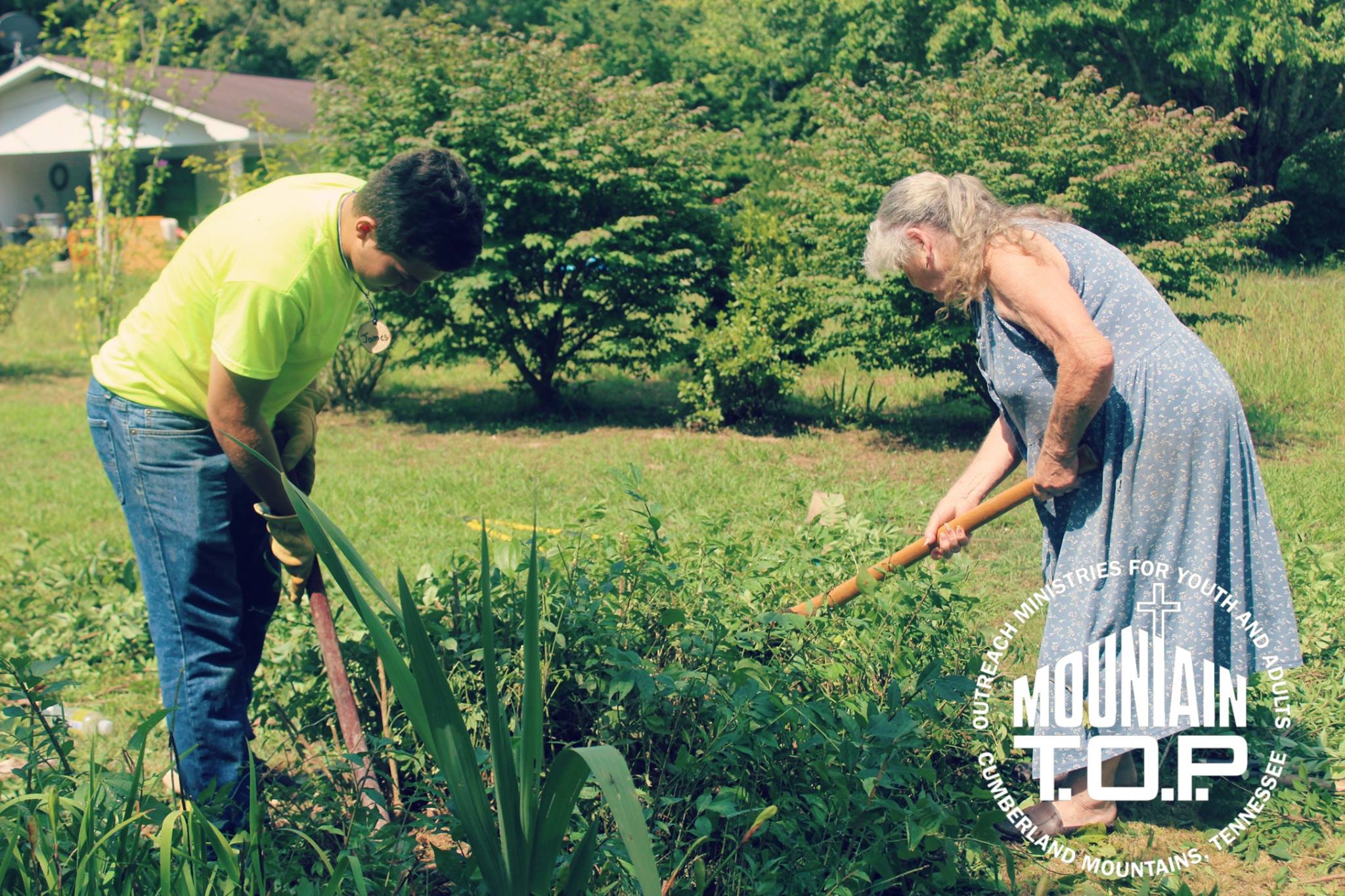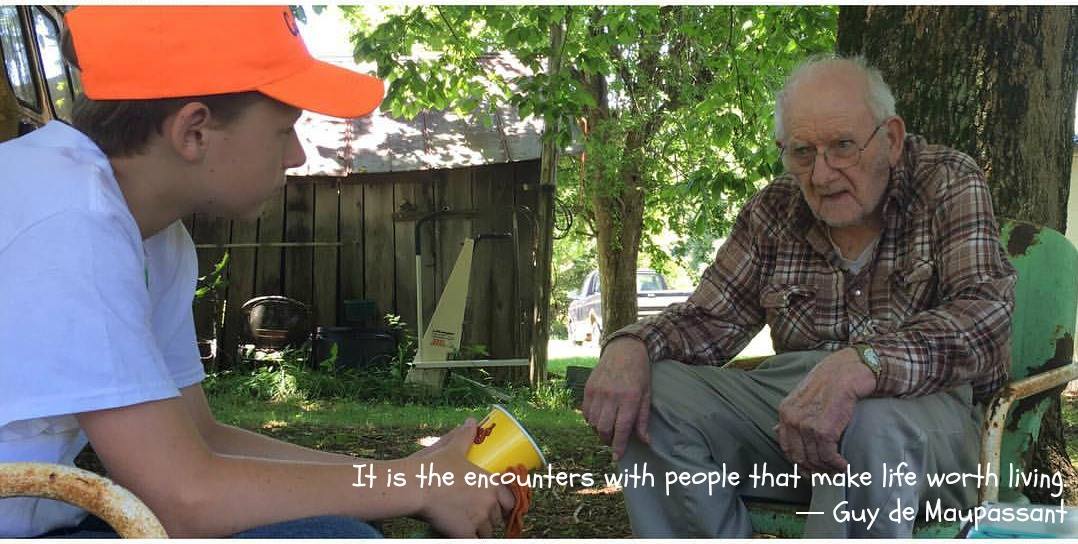Gifts and Lessons from George Bass
By Heather Lear

Last week I learned through social media that the founder and former director of Mountain T.O.P., George Bass, passed away. Since 1975, churches from all across the country have been coming to participate in day camp, youth, college-aged, and adult programs at Mountain T.O.P. (Tennessee Outreach Project) that serve the people of the Cumberland Mountains. As I reflect on the most formative experiences of my youth, Mountain T.O.P. is at the top of my list. I travelled to the mountains of Tennessee three times as a camper with my youth group from Springfield, Virginia, and I had the privilege of working on staff for two summers in while in college.
My news feed exploded with people sharing the news and offering short tributes. It took me until this morning to begin to really process the gifts and lessons George and his family gave to me as a teenager and young adult, and how those lessons continue to shape who I am and how I live into my calling. I had just completed the first year in my physical therapy program at Boston University when I arrived at my first staff training at Cumberland Pines in Grundy County, Tennessee. I had no intention of eventually entering full time ordained ministry, and never thought I would live in the Nashville area as an adult. Until I stopped to reflect last night, I hadn’t realized how much of what I have the privilege of teaching leaders and congregations around the country are some of those lessons learned up on the mountain. In many ways, my two intensive staff training experiences at Mountain T.O.P. provided more tools and better preparation for management, leadership, and relationship building than seminary. While definitely not exhaustive, here are some of those key lessons that I cherish from my time on the mountain:
1) Interpersonal relationship skills are crucial for leaders. At staff training, George would put us on the spot to lead a large group discussion or be thrown into a hypothetical conflict in fishbowl style in front of the rest of the staff. He was quick to forcefully interject when we weren’t employing the skills correctly, and we breathed a huge sigh of relief when our turn was over. Admittedly, this was a rattling experience for an 18 or 20 year-old, but these were priceless skills that have served all of us well in both our professional and personal lives. Some of the skills included using “I” language in times of conflict, so the other person doesn’t shut down. When talking to a crowd or leading a group, always “catch your corners.” Make sure everyone is engaged and feels part of the discussion. Don’t just tell people what you’re doing. Explain why you’re doing it. If you’re not sure why you’re doing something, maybe you need to take a step back. Most of the time, if there is a good reason, people will follow, even if it’s not easy or fun.
2) The home repair and projects we did in the community were not solely about meeting physical needs. Yes, someone might have needed a wheelchair ramp or yardwork done, but we were taught to see people holistically. None of us just have physical needs. We also have social, emotional, and spiritual needs. Many times, the prayers offered or the conversations around the kitchen table were as important as the paint on the walls or the porch being built. 3) We were not engaged in mission to or for people. We engaged in mission with people. I remember feeling really uncomfortable as a 19 year-old asking the home owners to make a contribution after the project was completed. What I came to realize was that invitation was one of empowerment. Even if they could also give a few dollars or a partially-full bucket of paint, they were invested and the relationship was one of dignity and mutuality.
3) We were not engaged in mission to or for people. We engaged in mission with people. I remember feeling really uncomfortable as a 19 year-old asking the home owners to make a contribution after the project was completed. What I came to realize was that invitation was one of empowerment. Even if they could also give a few dollars or a partially-full bucket of paint, they were invested and the relationship was one of dignity and mutuality.
4) The community was also empowered to care for one another. One of my major tasks my second summer on staff was to visit local businesses to build relationships and ask for donations. With their buy-in and contributions, the ministry became a partnership. I’ll admit that sometimes the donations were random (worship was interesting the weeks I was given 100 plastic apples), but those experiences also built confidence and character.
5) Love and support your local community. Locally-owned dairy bars, laundromats, drive-in movies, cafes, and thrift stores became our home-away-from-home. We tried to avoid the corporate chains and encouraged our campers to do the same. For at least a few weeks, we tried to be with the people where God had placed us for that time.
6) You eventually have to come down from the mountain. There’s work to be done at home as well. One of George’s goals was to help campers open their eyes to holistic needs of people everywhere. Who might be lonely and need someone to listen? Is there someone in my neighborhood or church who could use help with yardwork or cleaning? Are there kids in my community that need tutoring or extra attention? The Mountain T.O.P program always concluded by helping the campers reflect on how to continue to love and serve others beyond that week, and the Mountain T.O.P. theme song reinforced this idea.
Mountain Top by Brown Bannister
Chorus:
And I'd love to live on a mountain top
Fellowshipping with the Lord
I'd love to stand on a mountain top
'Cause I love to feel my spirit soar
But I've got to come down from that mountain top
To the people in the valley below
Or they'll never know that they can go
To the mountain of the Lord
As I reflect on years of ministry, I can’t even imagine how different my leadership and attitude toward mission would have been had I not been blessed with the opportunity to spend some significant time in my formational years on the mountain. Thank you, George. Well done, good and faithful servant!
Learn more about Mountain T.O.P. »
